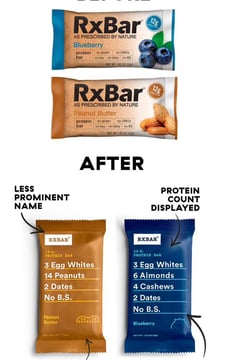Kiss the Prince
How storytelling can change your company life in a fairy tale. RXBAR case study
8/10/20244 min read


The Power of Storytelling in Modern Advertising: The Case of RXBAR
In today's fast-paced, content-saturated world, the ability to capture an audience's attention is more challenging than ever. While flashy graphics and catchy slogans may momentarily turn heads, it is storytelling that truly resonates, leaving a lasting impact. Storytelling in advertising goes beyond simply conveying information; it builds emotional connections, humanises brands, and creates memorable experiences. A compelling example of the power of storytelling in modern advertising is the case of RXBAR, a health-focused snack company that transformed its brand through authentic storytelling.
The Rise of RXBAR: A Brief Overview
RXBAR began as a small business in 2013, founded by Peter Rahal and Jared Smith in their Chicago kitchen. The company was born out of a desire to create a protein bar that was simple, clean, and free of unnecessary ingredients. What started as a small venture quickly gained momentum, but it wasn't until RXBAR embraced storytelling in its marketing strategy that the brand truly took off.
The Simplicity of the Message
From the outset, RXBAR positioned itself as a brand that values simplicity and transparency. Their product packaging was a key element of their storytelling approach. Rather than hiding behind flashy designs or obscure ingredient lists, RXBAR took a bold and straightforward approach: they listed the core ingredients of their bars right on the front of the packaging in large, clear text. "3 Egg Whites, 6 Almonds, 4 Cashews, 2 Dates, No B.S." became the brand’s signature tagline.
This simple, no-nonsense approach wasn't just about being clear; it was about telling a story of honesty and trust. In an industry often criticised for misleading labels and artificial ingredients, RXBAR stood out by aligning their packaging with their brand values. The packaging told a story of transparency and trustworthiness, resonating with health-conscious consumers who were tired of complicated, hidden ingredient lists.
The "No B.S." Campaign: Storytelling Through Authenticity
RXBAR’s marketing truly hit its stride with the "No B.S." campaign, which further cemented the brand's commitment to authenticity. The campaign was built around the idea that RXBARs are made with real, whole food ingredients, without any of the artificial additives or fillers often found in other protein bars.
The storytelling in this campaign was clear and consistent: RXBAR wasn't just another health food product; it was a brand that shared the values of its customers. The campaign used straightforward language and minimalistic visuals to communicate a powerful message: when it comes to your food, you shouldn't have to settle for anything less than the best.
This campaign extended beyond traditional advertising to include social media content, influencer partnerships, and even user-generated content. RXBAR encouraged its customers to share their own stories of choosing clean eating and rejecting "B.S." ingredients. This approach not only amplified the brand’s message but also created a community around shared values.
Humanising the Brand
Another aspect of RXBAR's storytelling success was their ability to humanise the brand. In a series of marketing materials, the company shared the story of its humble beginnings, with founders Peter Rahal and Jared Smith making bars by hand in a small kitchen. This narrative of two friends with a passion for healthy living resonated with consumers, adding a personal touch to the brand.
By sharing the story of its origins, RXBAR positioned itself as more than just a product; it became a brand with a relatable and inspiring backstory. This human element helped to build a deeper connection with consumers, who felt they were supporting a brand that aligned with their own values and aspirations.
The Results: A Brand That Resonates
The impact of RXBAR’s storytelling approach is evident in the brand’s rapid growth. By 2017, just four years after its founding, RXBAR had become a major player in the health food market, leading to its acquisition by Kellogg’s for $600 million. This success can be attributed in large part to the brand’s commitment to storytelling that was authentic, consistent, and aligned with the values of its target audience.
Lessons for Modern Advertisers
The success of RXBAR highlights several key lessons for modern advertisers:
1. Authenticity Matters: Consumers are increasingly drawn to brands that are transparent and authentic. By staying true to your brand's values and communicating them clearly, you can build trust and loyalty.
2. Simplicity is Powerful: In a world filled with noise, simplicity can be a breath of fresh air. Clear, straightforward messaging can often be more impactful than complex campaigns.
3. Humanise Your Brand: Sharing the story behind your brand can help create a personal connection with your audience. People are more likely to support a brand that they feel connected to on a human level.
4. Engage Your Audience: Encouraging user-generated content and building a community around shared values can amplify your message and create a loyal customer base.
In the competitive world of modern advertising, storytelling remains one of the most powerful tools at a brand’s disposal. The case of RXBAR demonstrates how a well-crafted story, rooted in authenticity and simplicity, can elevate a brand from obscurity to industry leadership. By focusing on what truly matters to consumers and telling a story that resonates, advertisers can create campaigns that not only capture attention but also build lasting connections.
P.


